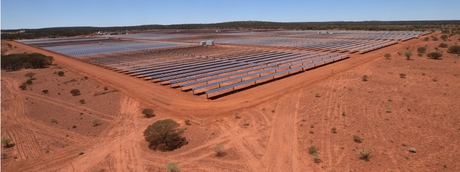DeGrussa off-grid solar project now fully operational

The end of May marked a major milestone in off-grid renewables, with a pioneering solar and battery storage project in remote Western Australia becoming fully operational. The $40 million solar and storage project is expected to reduce the DeGrussa Copper-Gold Mine’s annual diesel consumption by about 5 million litres and cut carbon emissions by more than 12,000 tonnes — a reduction of more than 15%.
The DeGrussa project is the largest integrated off-grid solar and battery storage project in Australia, featuring the installation of more than 34,000 solar photovoltaic (PV) panels, alongside 6 MW (1.8 MWh) of new battery storage. The project is owned by French renewable energy firm Neoen, with juwi Renewable Energy responsible for the project development, EPC and O&M.
The juwi solar hybrid system has been constructed to fully integrate with the diesel-fired power station at the DeGrussa mine. The project’s 34,080 solar PV panels are attached to a single-axis tracking system mounted on 4700 steel posts, enabling the panels to track the sun during the day. The panels are connected via an extensive network of low-voltage, high-voltage and communication cables to a 6 MW lithium-ion battery storage facility and the existing power station.

The plant has now been ramped up to its full generating capacity, confirming that it can perform in accordance with contractual specifications. Testing and commissioning activities are continuing to fully integrate the project with the existing diesel-fired power station and to ensure it can maintain stable operations at 100% generation capacity.
The Australian Renewable Energy Agency (ARENA) is supporting the project with $20.9 million recoupable grant funding. The agency’s CEO, Ivor Frischknecht, described the project as “the largest off-grid solar PV system in the world and one of the largest solar plants providing peak power load to a mining operation”, with mine owner Sandfire Resources “benefiting from more predictable power costs and … anticipating potential cost savings through reduced reliance on trucked-in diesel”.
“Cutting-edge technology is being demonstrated at the site, with advanced lithium-ion batteries storing solar power and sun-tracking solar PV panels maximising plant output,” he added. “Smart control systems are linking these components with the existing diesel plant to maximise the amount of renewable energy delivered.”

The Clean Energy Finance Corporation (CEFC), which committed $15 million in debt finance to the project, has also welcomed the result, with CEO Oliver Yates saying the project shows the clear economic potential for off-grid renewables in regional and remote Australia.
“With this project now operational, and given the price reductions we are seeing in solar and batteries, the economics of remote solar and storage are becoming attractive even when oil prices are low,” he said.
“Soon remote communities and mines will be able to reduce the need for expensive trucked-in diesel used in dirty generators. This project demonstrates the financial, health and environmental benefits that moving towards renewable energy solutions can provide.”
Solar cell achieves world record for efficiency
University of Queensland researchers have set a world record for solar cell efficiency with...
Boral secures grant for cement kiln carbon reduction
The project will reduce process emissions from cement clinker manufacturing by up to...
Vast secures grant to progress SA Solar Fuels project
HyFuel Solar Refinery, a subsidiary of Vast, has been awarded $700,000 through the ASLET...










